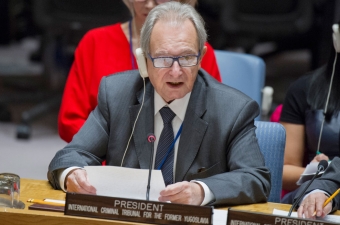ICTY President Carmel Agius today addressed the United Nations Security Council, highlighting the Tribunal’s diligent progress towards the completion of its mandate and discussing the outstanding challenges.
The President noted that judgement in the Stanišić & Župljanin appeal case was delivered during the reporting period, and that both the Mladić trial and Prlić et al. appeal remain on track, with judgements anticipated to be delivered by the end of November 2017.
In relation to the pending contempt case of Jojić et al., President Agius reminded the Council that the Republic of Serbia has yet to execute ICTY arrest warrants for three indictees that were issued 22 months ago. He stressed that cooperation with the Tribunal is a “vital responsibility” and added that: “While the Tribunal appreciates that political sensitivities may arise in certain circumstances as a result of cooperating with the ICTY, these can never constitute an excuse for failing to do so.”
The President requested the Security Council’s support in this matter, underlining that “contempt of court sabotages the Tribunal’s ability to conduct fair and efficient legal proceedings.” He urged the Council to ensure that the Republic of Serbia complies with the Trial Chamber’s orders, in line with its obligations under Article 29 of the Tribunal’s Statute. President Agius further called upon all Member States to execute the international arrest warrants issued recently for the three indictees, stressing that the Tribunal stands ready to conduct proceedings in this case expeditiously, with full respect for due process.
President Agius observed that his half-yearly report to the Security Council contained a section on the Tribunal’s implementation of recommendations made by the UN Office of Internal Oversight Services (OIOS), following an evaluation of the ICTY’s work and methods. In this regard, he expressed regret that the OIOS evaluation was carried out at the end of the Tribunal’s lifespan, but announced that one of the recommendations was partially implemented through the adoption of a ‘Code of Professional Conduct for Judges of the Tribunal’ in July of this year.
As in his previous addresses to the Security Council, the President once more alerted Member States to the critical problem facing the Tribunal in the form of staff attrition. He noted that, if left unchecked, ongoing staff attrition will increase the risk of the Tribunal not being able to complete the remaining cases by the end of November 2017. To mitigate this risk, President Agius requested Member States’ support for a proposal developed by the ICTY to address staff retention during the last stage of the Tribunal’s work.
In conclusion, President Agius reflected on the Tribunal’s role in the development of international justice system, stating that: “Not only has it changed the way we think about and react to impunity, it has served as a powerful catalyst for the establishment of other international courts and tribunals.” In its final year, the President added, the Tribunal looks forward to completing its final cases, cementing its legacy and continuing to work with the Security Council towards the completion of its mandate.


